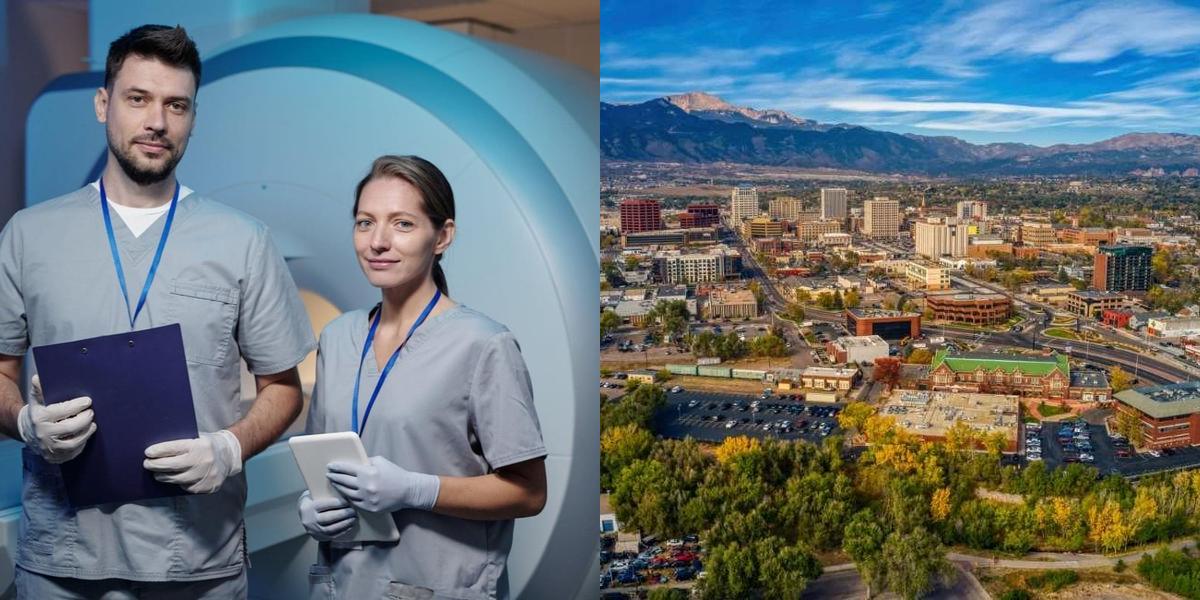How to Become a Radiology Technician in Colorado (2025)

Becoming a radiology technician is a fantastic way to build a rewarding career in medical imaging, offering diverse job opportunities and a highly competitive salary. With national median pay for radiologic technologists at $77,660 per year (BLS, May 2024) and an even higher average in Colorado, this field is a fast-growing and stable entry point into healthcare. This guide breaks down the essential steps to get your degree, certification, and start your career in Colorado.
Career Paths and Opportunities after Becoming a Radiology Technician
Becoming a Radiology Technician opens up various career paths and opportunities in radiology and medical imaging. Here are some possible career paths and opportunities to explore after becoming a Radiology Technician.
-
Radiologic Technologist: As a Radiologic Technologist, you will perform diagnostic imaging procedures, including X-rays, CT scans, and MRIs. You will work closely with physicians and other healthcare professionals to obtain high-quality images and assist in diagnosing and treating patients. Radiologic Technologists can work in hospitals, clinics, imaging centers, and other healthcare facilities.
-
CT Technologist: CT Technologists specialize in performing computed tomography (CT) scans. They use specialized equipment to capture detailed images of a patient's internal structures, helping physicians diagnose and treat various conditions. CT Technologists may work in hospitals, diagnostic imaging centers, or specialized CT departments.
-
MRI Technologist: MRI Technologists operate magnetic resonance imaging (MRI) scanners to produce detailed images of a patient's organs and tissues. They work closely with radiologists and other healthcare professionals to ensure accurate image capture and interpretation. MRI Technologists can find employment in hospitals, imaging centers, and specialized MRI departments.
-
Mammography Technologist: Mammography Technologists specialize in performing mammograms, which are breast X-ray images. They play a crucial role in the early detection and diagnosis of breast cancer. Mammography Technologists work in hospitals, breast imaging centers, and dedicated mammography facilities.
-
Radiology Supervisor/Manager: With experience and additional education, Radiology Technicians can advance to supervisory or managerial roles. Radiology Supervisors or Managers oversee the daily operations of a radiology department, manage staff, and ensure the quality and efficiency of imaging services.
-
Radiology Educator/Instructor: Some Radiology Technicians pursue a career in education and become Radiology Educators or Instructors. They teach and train aspiring Radiology Technicians, sharing their knowledge and expertise to prepare the next generation of professionals.
-
Radiology Sales Representative: Another career path for Radiology Technicians is in sales. Radiology Sales Representatives work for medical equipment manufacturers or suppliers, promoting and selling radiology equipment and supplies to healthcare facilities.
Frequently Asked Questions
What does a radiology technician do?
A radiology technician, also known as a radiologic technologist, specializes in performing diagnostic imaging procedures to help diagnose and treat various medical conditions. Their main duties include operating imaging equipment like X-ray machines, CT scanners, and MRI machines; preparing and positioning patients for imaging procedures; administering contrast agents when needed; and ensuring safety by following radiation protection protocols. They also collaborate with radiologists to interpret and analyze the images they produce.
How long does it take to become a radiology technician?
Becoming a radiology technician typically involves completing an accredited program, which usually takes about 2 years for an associate degree or 1 year for a certificate program. After completing your education, you will need to pass the certification exam, which can take additional time for preparation. In total, the process generally takes between 12 months to 2 years depending on the type of program you choose.
How much do radiology technicians make in Colorado?
Radiology technicians in Colorado earn an average annual salary of $80,140, according to the Bureau of Labor Statistics (BLS) as of May 2023. This salary can vary based on factors such as experience, location, and type of healthcare facility.
Does Colorado require a state license for radiology?
Yes, Colorado requires radiology technicians to obtain a state license from the Colorado Department of Public Health and Environment (CDPHE) in addition to national certification from the American Registry of Radiologic Technologists (ARRT) to practice legally in the state.
Does Colorado State have a radiology program?
Yes, Colorado State offers radiology programs. You can find accredited radiology technician training programs at various institutions in Colorado, including schools in cities like Denver and Colorado Springs. These programs provide the necessary education and clinical experience to become a certified radiology technician.
Final Thoughts
A career as a radiology technician offers not only job security but also the chance to make a meaningful impact in healthcare. Whether you’re in Colorado or exploring opportunities elsewhere, resources like Dreambound make it easier than ever to find the right program and take the first step toward success.
Ready to get started? Explore programs near you and begin your journey today!
If you're thinking of a new career path, Dreambound offers in-depth guides to understand various job choices:

Athena is Co-founder and CEO of Dreambound.





